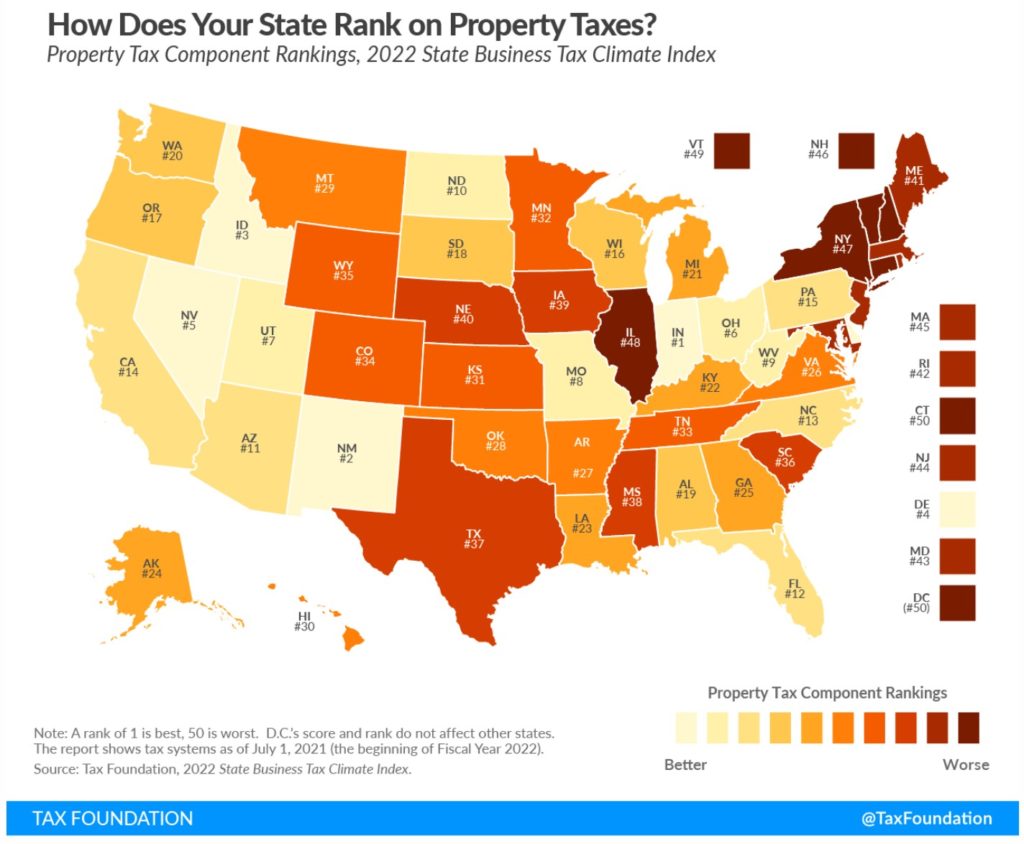Property taxes are a significant source of revenue for states and the largest source of tax revenue for localities. Nationwide in fiscal year 2020, property taxes consisted of 38% of total U.S. state and local tax collections, which is a greater proportion than any other source of tax revenue. According to a report by the Tax Foundation, Alaska ranks 24th in the nation for property tax burden.
Property taxes are usually based on the fair market value of a property, while in commercial cases property taxes are based on income potential, with Alaska imposing rate limits and levy limits which serve to constrain property tax growth. Property taxes are determined by a variety of local political subdivisions, including boroughs, cities, school boards, fire departments, utility commissions, and more. In 2020, the average combined state and local property tax rate in Alaska was 1.02%, although rates vary based on locality, and the average combined tax collections per capita was $2,222.
Though property taxes are typically unpopular among business and property owners in Alaska, this form of taxation tends to be less economically harmful than income and sales taxes. Heavy reliance on property taxes often is a substitute for lowered or no taxes on sales, individual income, corporate income, and excise taxes, such as in Texas and New Hampshire. Property taxes tend to be less harmful to economic growth, since income taxes disincentivize labor and savings, and sales taxes rely on current consumption. In addition, while income taxes become proportionally higher as income rises, property taxes tend to be a fixed percentage of the property’s value, and Alaska already uses two methods to constrain the growth of property taxes.
Property taxes, while irksome, are more transparent than most taxes. Income taxes are typically withheld from paychecks, and sales taxes are paid piecewise in hundreds of transactions throughout the year, while property owners generally have a good sense of what their property taxes are each year. Additionally, property value is often related to the market value of benefits that government affords in the area, such as roads, schools, and emergency services. This, of course, is another advantage of property tax: it is largely used for local improvements, which is one of the few ways that taxpayers see tangible benefits in return for their tax dollars.
Alaska levies higher property tax instead of little or no statewide income taxes and sales taxes and this primes the state to have an economic advantage over states that impose high taxes in all three major taxes. Compared to the states with the most competitive property tax systems — Indiana, New Mexico, Idaho, Delaware, and Nevada — Alaska still performs the best when it comes to the overall tax burden.
As unsavory as writing a large check for property taxes each year is, it is preferable to having work and consumption disincentivized via income and sales taxes — and it helps keep your tax dollars in the local community. Additionally, property owners have more say in property tax changes in their communities through things like school bonds and levies. Community members should pay close attention to proposed changes and evaluate carefully the benefits and burdens.
If Alaska were to implement an income tax or sales tax, it would surely discourage economic growth and flourishing businesses, contracting economic recovery after the COVID-19 pandemic. To keep the Last Frontier business-friendly and economically strong, Alaska must continue to guard against burdensome taxes and wasteful state and local spending.
